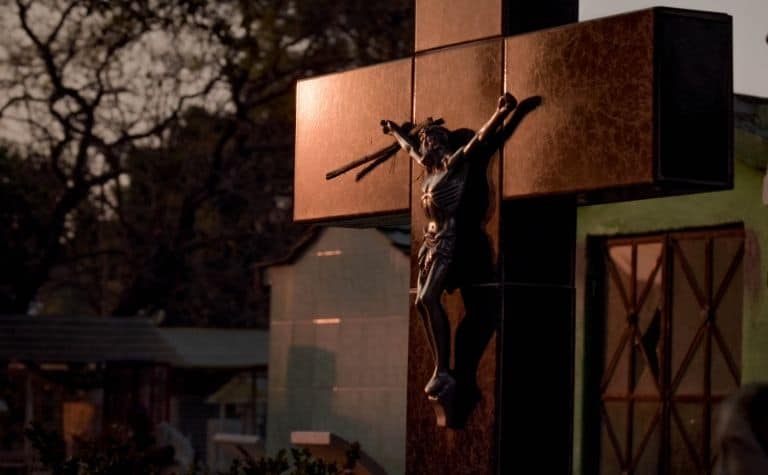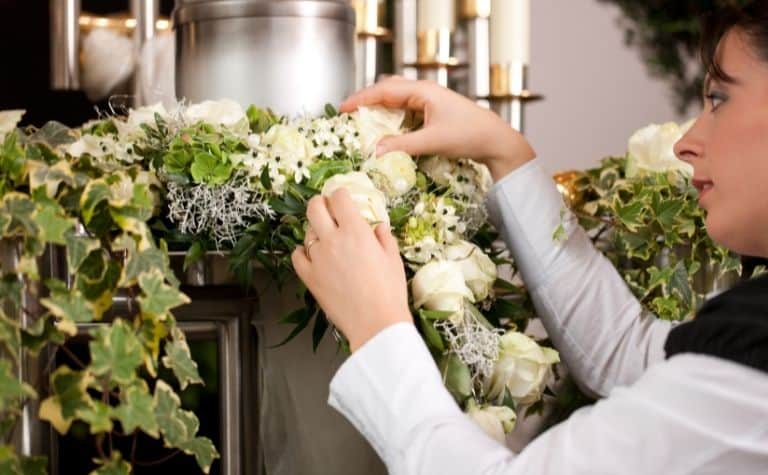More people have their bodies cremated upon their physical death than ever. [1] Cremation has become more popular than burial for various reasons, including lessening the financial burden on loved ones and reducing the environmental impact. The Catholic Church prefers that bodies be buried, yet provides guidelines for those who choose cremation.
The Roman Catholic Church permits cremation as long as the motivation for it doesn’t conflict with Christian teaching. It also offers essential guidelines for the ashes, which may not be spread outside or kept in urns. These rules reflect Catholic beliefs about death, hope, and faith.
When is it a sin to get cremated? Can a cremated person still receive a Catholic funeral? Why does the Catholic church prefer burial — what does it matter? Keep reading to learn more.
Also, see How and Why Do Some Protestants Convert to Catholicism? to learn more.

Is It a Sin To Get Cremated?
According to the official teachings of the Catholic church, cremation isn’t a sin. However, the motivation for being cremated can be sinful if it’s contrary to Christian teaching.
When the motivation for cremation doesn’t contradict Christian teaching, then it’s a matter that calls for using wisdom.
The Code of Canon Law 1176 states, “The Church earnestly recommends that the pious custom of burying the bodies of the dead be observed; it does not, however, forbid cremation unless it has been chosen for reasons which are contrary to Christian teaching.” [2]
The act of cremation alone, aside from a person’s motivation for it, isn’t a transgression of God’s law. The act of cremation doesn’t offend God, according to Catholic teaching, just as someone dying in a burning building or forest fire isn’t inherently sinful.
However, if a person’s motivation aligns with Hindu or Buddhist teaching, for example, which is contrary to a biblical worldview, then their reason for desiring cremation is sinful. (Also see Catholic vs. Presbyterian: What’s the Difference?)
Can You Have a Catholic Funeral Mass If You Are Cremated?
The Catholic church permits funeral masses for cremated people as long as their reasons for not choosing burial didn’t conflict with Christian teaching.
If it does conflict with Christian teaching, the church will refrain from aligning itself with non-biblical belief systems and practices to preserve the holiness and purity of its ministries.
What is the purpose of a Catholic funeral mass? The purpose of a funeral mass isn’t just to pay respects to the deceased, but it’s an occasion for the church to minister to loved ones in their sorrow and to affirm their beliefs about God, death, and the afterlife.
One of the church’s clearly-stated reasons for funerals is to honor the bodies of the deceased, which reflects the importance of physical bodies, even upon death, according to Catholic theology (Canon 1176).
Does a Catholic have to be buried in a church cemetery? Not necessarily. Some churches don’t have cemeteries, but even if one does, people are free to be buried elsewhere. Everyone “is permitted to choose the cemetery of burial unless prohibited by law.” (Canon 1180). (Also see Catholic vs. Baptist: What’s the Difference?)
Who should not receive funerals in Catholic churches? Canon Law 1184 clearly states that some people must not receive a funeral in a Catholic church.
The commonality between those mentioned is their lack of faith in Christ, their promotion of false teachings, and people who choose cremation for the wrong reasons:
- “notorious apostates, heretics, and schismatics”
- “those who chose the cremation of their bodies for reasons contrary to Christian faith”
- “other manifest sinners who cannot be granted ecclesiastical funerals without public scandal of the faithful” [3]
Aren’t there other occasions when a body isn’t available for funerals? Of course. Sometimes how a person dies determines whether their body is present at a funeral.
Someone who loses their life in combat, drowns at sea, or dies in a plane crash, can still have a Catholic funeral even though there may not be a body present.
The reasons for cremation, and their possible conflict with Christian teaching, are the crux of the issue, according to church leadership.
God is all-powerful and is able to restore a burned body, or one destroyed in another fashion, at the end of time, just like he is able to restore one that is buried in a coffin in a graveyard. (Also see Catholic vs. Methodist: What’s the Difference?)

What Are the Rules for the Ashes?
If a person chooses cremation, even for appropriate reasons, how loved ones handle the ashes of the deceased is important, according to church teaching.
- The ashes of the deceased may be laid to rest in a sacred place, like a church cemetery.
- Examples of forbidden practices include: sprinkling their ashes at sea, encasing them in a piece of jewelry like a necklace, and keeping them in an urn in one’s home.
- The ashes of the deceased must not become sacred; Catholic history contains stories of people who treated the bodies of deceased people, or part of them, like hair and fingernails, as holy objects, which is contrary to Christian teaching.
- The ashes of the deceased person must not be divided; it’s not permissible for a family to have some of a person’s ashes in a church cemetery and some in an urn in their home, or some in a church cemetery and some sprinkled at sea.
What if a cremated person doesn’t want a Catholic funeral, but their family wants one for them? Whether a person is cremated or buried, a funeral mass for someone who doesn’t want one isn’t permissible.
“When the deceased notoriously has requested cremation and the scattering of their ashes for reasons contrary to the Christian faith, a Christian funeral must be denied to that person according to the norms of the law.” [4]
What if a person wants to be buried, but their family wants them to be cremated? According to church teaching, this is strictly forbidden.
“In circumstances when cremation is chosen because of sanitary, economic or social considerations, this choice must never violate the explicitly stated or the reasonably inferable wishes of the deceased faithful.” [4] (Also see The Largest Christian Denominations: Top 100)
Also, see How Did the Catholic Church Get So Rich? to learn more.

Why Does the Catholic Church Prefer Burial?
The Bible teaches that physical bodies will experience resurrection one day. God created human beings in his image and according to his likeness on the sixth day of creation (Gen. 1:26-27).
Bodies have inherent worth because they are God’s design and bear his image. Sin marred bodies with aging, weakness, disability, and disease, but they will be redeemed through Jesus Christ. Bible verses that reflect on this future reality include,
- Romans 8:11, “If the Spirit of him who raised Jesus from the dead dwells in you, he who raised Christ Jesus from the dead will also give life to your mortal bodies through his Spirit who dwells in you.” (ESV)
- John 6:40, “For this is the will of my Father, that everyone who looks on the Son and believes in him should have eternal life, and I will raise him up on the last day.” (ESV)
- Philippians 3:21, “Who will transform our lowly body to be like his glorious body, by the power that enables him even to subject all things to himself.” (ESV)
Also, see Do Catholics Believe the Pope Speaks Directly to God? to learn more.
References:
[1] Source
[2] Source
[3] Source
[4] Source
Related Questions
Catholic vs. Protestant vs. Orthodox: What's the Difference?
Roman Catholicism, Protestant Christianity, and the Eastern Orthodox Church are the three historical branches of the Christian religion. Each tradition traces its doctrines and practices to the New...
Roman Catholicism vs. Eastern Orthodoxy: What's the Difference?
The Roman Catholic Church and the Eastern Orthodox Church, along with Protestantism, comprise the three historical branches of the Christian religion. The Catholic and Orthodox branches separated...
